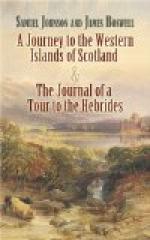Of their black cattle, some are without horns, called by the Scots humble cows, as we call a bee an humble bee, that wants a sting. Whether this difference be specifick, or accidental, though we inquired with great diligence, we could not be informed. We are not very sure that the bull is ever without horns, though we have been told, that such bulls there are. What is produced by putting a horned and unhorned male and female together, no man has ever tried, that thought the result worthy of observation.
Their horses are, like their cows, of a moderate size. I had no difficulty to mount myself commodiously by the favour of the gentlemen. I heard of very little cows in Barra, and very little horses in Rum, where perhaps no care is taken to prevent that diminution of size, which must always happen, where the greater and the less copulate promiscuously, and the young animal is restrained from growth by penury of sustenance.
The goat is the general inhabitant of the earth, complying with every difference of climate, and of soil. The goats of the Hebrides are like others: nor did I hear any thing of their sheep, to be particularly remarked.
In the penury of these malignant regions, nothing is left that can be converted to food. The goats and the sheep are milked like the cows. A single meal of a goat is a quart, and of a sheep a pint. Such at least was the account, which I could extract from those of whom I am not sure that they ever had inquired.
The milk of goats is much thinner than that of cows, and that of sheep is much thicker. Sheeps milk is never eaten before it is boiled: as it is thick, it must be very liberal of curd, and the people of St. Kilda form it into small cheeses.
The stags of the mountains are less than those of our parks, or forests, perhaps not bigger than our fallow deer. Their flesh has no rankness, nor is inferiour in flavour to our common venison. The roebuck I neither saw nor tasted. These are not countries for a regular chase. The deer are not driven with horns and hounds. A sportsman, with his gun in his hand, watches the animal, and when he has wounded him, traces him by the blood.
They have a race of brinded greyhounds, larger and stronger than those with which we course hares, and those are the only dogs used by them for the chase.
Man is by the use of fire-arms made so much an overmatch for other animals, that in all countries, where they are in use, the wild part of the creation sensibly diminishes. There will probably not be long, either stags or roebucks in the Islands. All the beasts of chase would have been lost long ago in countries well inhabited, had they not been preserved by laws for the pleasure of the rich.
There are in Sky neither rats nor mice, but the weasel is so frequent, that he is heard in houses rattling behind chests or beds, as rats in England. They probably owe to his predominance that they have no other vermin; for since the great rat took possession of this part of the world, scarce a ship can touch at any port, but some of his race are left behind. They have within these few years began to infest the isle of Col, where being left by some trading vessel, they have increased for want of weasels to oppose them.




